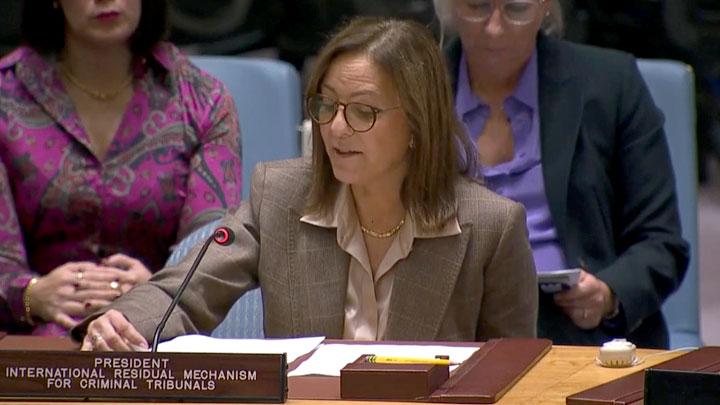President Gatti Santana briefs the UN Security Council on progress of Mechanism work

The President of the International Residual Mechanism for Criminal Tribunals (Mechanism), Judge Graciela Gatti Santana, today presented the Mechanism’s twenty-first progress report to the United Nations Security Council (Council) in New York. This was President Gatti Santana’s first address to the Council since she assumed office on 1 July 2022.
At the outset, President Gatti Santana remarked on the significant progress made in relation to the Mechanism’s pending judicial caseload. In this regard, she noted there were only two main cases remaining before the Mechanism, namely the trial against Mr. Félicien Kabuga, which commenced on 29 September in The Hague, and the Stanišić and Simatović appeal proceedings.
In relation to the Kabuga case, President Gatti Santana praised the innovative and efficient conduct of the trial proceedings, adding that 20 out of the approximately 50 in-court Prosecution witnesses are expected to be heard by the end of this year, while the projection for the completion of the trial phase remains by September 2024. Regarding the Stanišić and Simatović case, the President indicated that the in-person appeal hearing is scheduled to take place on 24 and 25 January 2023, with the delivery of judgement expected by June 2023.
Turning to other matters, the President remarked on the importance of full cooperation of States with the Mechanism, including in contempt of court cases. To this end, referring to the Jojić and Radeta case, she expressed her disappointment and called once again on the Republic of Serbia to meet its “unequivocal obligation to cooperate with the Mechanism”.
President Gatti Santana then raised the situation of the eight acquitted or released persons who were relocated to Niger in December 2021, and who have since been “living under de facto house arrest, despite them being free men”. The President called upon State assistance in finding an urgent solution to this crisis, noting that “our collective inability to find a durable solution not only reflects negatively on the Organisation but also on the credibility of international justice as a whole”.
In reference to resolution 2637 (2022), adopted by the Council in June, President Gatti Santana reported that the Mechanism has started developing a strategy to guide the Mechanism’s transition to a truly residual court, starting with a “roadmap to develop a Mechanism-wide scenario-based workforce plan”. The President briefly explained the three drawdown phases laid out by the roadmap, including the first phase of completing the ad hoc judicial activities and the tracking of fugitives; the second phase of focusing exclusively on the Mechanism’s continuous residual functions; and the third phase, in which even these functions will have a greatly-reduced workload.
Noting that the Mechanism’s ability to plan for the future is dependent on its ability to address present challenges, the President reiterated the critical importance of further support in the enforcement of sentences. In this context, she appealed to other States to join the 13 enforcement States that are currently assisting the Mechanism in this crucial area.
Finally, President Gatti Santana urged the international community to remain steadfast in its commitment to the fight against impunity, while underscoring the need to continue countering genocide denial, revisionism and the glorification of war criminals by defending and disseminating the truth. The President emphasised that justice and peace “are the most pressing needs of today’s world” and that the Mechanism is proud of its contribution in this regard.